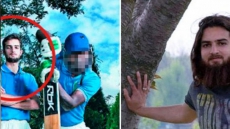A simple reference towards the end of his Independence Day speech by Prime Minister Narendra Modi has thrown open Pakistan's festering Balochistan wound, rattling a neighbour India has for decades blamed for stoking trouble in Jammu and Kashmir.
Modi, in tit-for-tat tactics, has thrown open a Pandora's Box that has geopolitical implications and holds the potential of changing the direction of India's foreign policy. Balochistan has been as troubling for Pakistan as Kashmir has been for India.
But Pakistan's largest province has not received as much international attention as Kashmir -- mostly because the region, often described as a "black hole", is "no-go area" for journalists -- unlike Kashmir. On the other hand, Pakistan has always raked up the Kashmir issue globally and spoken about the alleged rights violations in India's only Muslim-majority state.
The Pakistani province -- almost the size of France -- is rich in gas, gold, copper, oil and uranium, but it has been plagued by an unending cycle of violence and underdevelopment since the 1947 division of the sub-continent and the formation of India and Pakistan as separate nations.
The restive province, spread over 40 per cent of Pakistan's total land mass but consisting of less than four per cent of its population, has never made global headlines despite activists alleging that security forces have been committing alleged genocide of Balochis to kill their aspirations for a free, sovereign nation.
The history of the region is that of broken promises, rights abuses, induced poverty and repressive rule of elite Punjabis.
Pakistan has been alleging that India's spy agency, the Research and Analysis Wing (R&AW), has been stoking trouble in the region by sponsoring the separatist campaign there. India has always denied such allegations.
Historically, Balochistan has never been part of the sub-continent and consisted of four princely states -- Kalat, Lasbela, Kharan and Makran -- under the British Raj. The region finds more similarities with Afghanistan and Iran than India or Pakistan.

It is generally believed that Pakistan's first governor-general Mohammad Ali Jinnah coerced the last independent Baloch ruler Mir Ahmad Yar Khan to sign an instrument of accession.
Some historical accounts, disputed by critics, says that three months before Pakistan was formed Jinnah had negotiated the freedom of Balochistan from the British.
In fact, a communiqué dated August 11, 1947, stated that a standstill agreement had been made between Pakistan and the region, and discussions would take place between Pakistan and Khan with a view to reaching agreements on Defence, External Affairs and Communications.
Despite the standstill agreement, the Pakistan Army, on March 26, 1948, moved into Baloch coastal regions. Days later, it was announced in Karachi that Khan has agreed to merge his state with Pakistan.
What followed is a chronicle of bloodshed, denial of basic rights and acute deprivation amid military operations to crush any voice raised for freedom of the region.
"The human rights situation in Balochistan is drastically deteriorating, with the region's respective governments failing at their most basic duty -- to protect the safety of their citizens and enforce the rule of law," says a report compiled after a last year Geneva conference titled "Balochistan in the Shadows".
Angry over Pakistan's exploitation of the resources and its repressive rule, Balochis have so far launched five low-intensity armed insurgencies since 1948.
A prominent Baloch activist, Naela Quadri, in an interview to IANS in April, accused Pakistan of resorting to "genocide" in response to the "political, democratic and secular" freedom struggle.
"They have killed some 200,000 Balochis in the last decade. The Pakistan Army has participated in enforced disappearance of 25,000 people, including men and women," Quadri said.

"They are using all the eight UN indicators of genocide, including dehumanisation, polarisation, extermination and denial."




